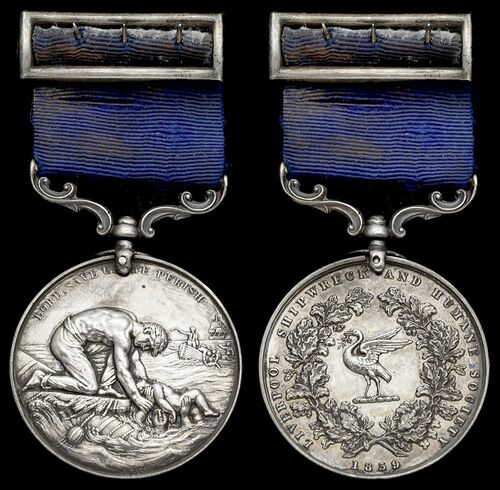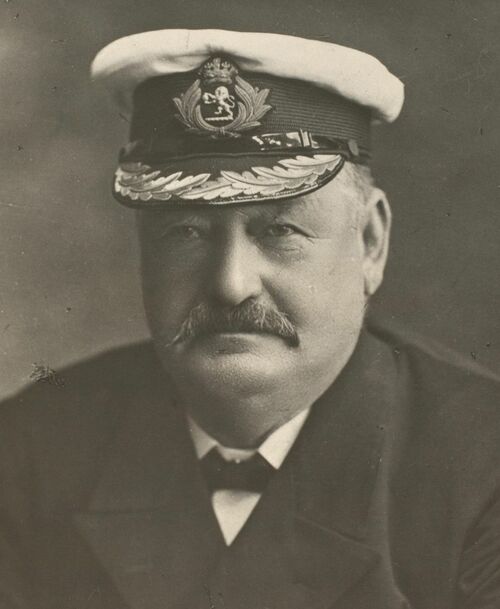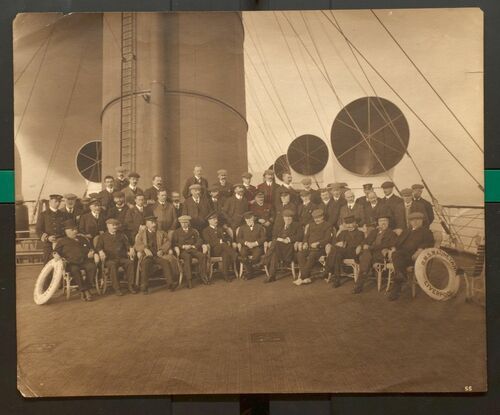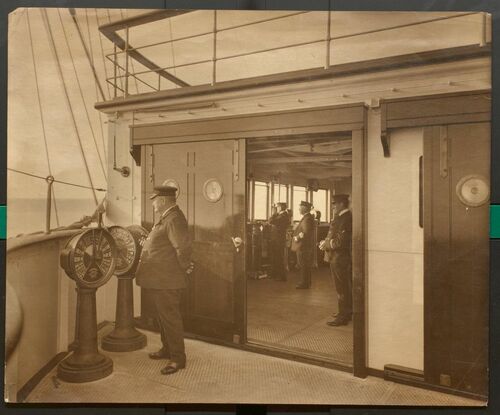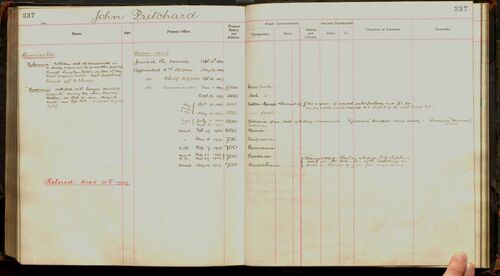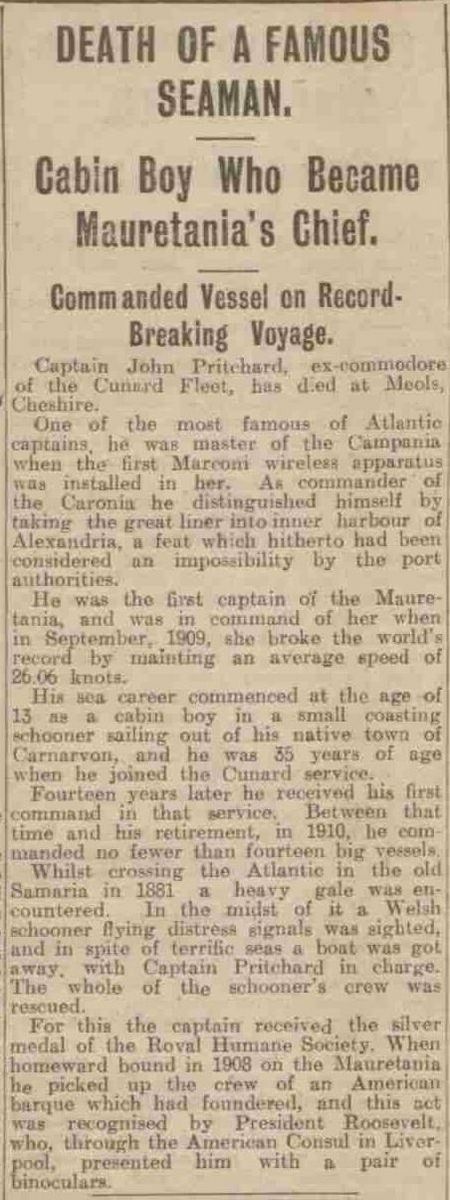Auction: 23001 - Orders, Decorations and Medals
Lot: 411
Liverpool Shipwreck and Humane Society Marine Medal, (John Pritchard. 4th Off.cr S.S. "Samaris" For Rescuing '5 Men From Barque "Mary" Jany 15/81), silver, claw loose, otherwise good very fine
John Pritchard was born on 12 August 1845 at No. 23 Pool Hill, the son of a coachman, Griffith Pritchard and his wife Magret. During the 19th century, when Caernarfon was a busy slate exporting port, many of its sons embarked on a career as seafarers and some became Master Mariners of repute. However, none of them ever enjoyed the success of young Pritchard, one of four children, thought the only boy. He was their second child and was educated at the old National School (Yr Ysgol Rad) in the early 1850's. Mr. Foster was the headmaster and had held the post since the school was opened 1843. He received further instruction in Navigation from Captain Robert Morris, a retired Master Mariner who kept a school in Pool Side, and went to sea at the age of 13 in 1858.
His first ship was the 117 tonne Caernarfon Schooner Empress, Master and Owner being Captain Thomas Hudson, the maternal grandfather of the well-known Welsh Scholar and Caernarfon-born Professor T. Hudson Williams, author of the book "Atgofion am Caernarfon" (Memories of Caernarfon), published in 1950.
Young John joined the crew of the new 120 tonne schooner Eleanor Thomas in 1860, the Master and Owner was William Thomas, better remembered as the first Captain of the well-known Caernarfon built schooner Napoleon. It was extremely fortunate that he did, for the Empress was lost with all hands off Hamburg in 1860.
Pritchard worked hard at his studies and in 1868, he qualified for his Second Mate's certificate. Again successful in attaining his First Mate's Certificate in 1870 and at the age of 29, he passed his final exams for Master Mariner. It was not long before he had command of a ship and it is known that he became master of two vessels: the Prince of Wales and the Sybil Wynn.
During this period he married the sister of D.T. Edwards, licensee of the Drum Inn, Market Street, and both he and his brother-in-law had shares in the Sybil Wynne. Leaving Caernarfon in 1879, the next that was heard of him was that he had been given the task of bringing out a new 80 tonne steamer Princess of Wales from the shipyard at Wallsend on the Tyne and this is believed to be the smallest steamer ever to have been built. Shortly afterwards he joined the Cunard Shipping Co. and served for 14 years as Mate on several of the larger passenger ships. Given the opportunity to command the Samaria in 1894, from then on until his retirement in 1910 he was captain of at least a dozen of the company's largest vessels, such as the Carmania, Caronia, Compania, Etruria, Lucania and Saxonia.
Summoned to go once again to Wallsend in 1907 he took charge of the new and best known, in her day, of the Cunard liners - The Mauretania.
This steamer was 331 times heavier than the Princess of Wales which he had safely brought out of Wallsend 28 years previously.
It is indeed difficult to imagine the size of this giant liner, which needed 800 staff that included 70 sailors, 366 engineers, 376 stewards to be responsible for the comfort and wellbeing of the passengers. 812 in all and one of them had overall charge of the others, Captain John Pritchard from Pool Hill, Caernarfon who went to sea as a cabin boy at the age of 13, nearly half a century earlier.
During the 30 years that he was employed by Cunard, he was commended twice. The first time was in 1881 when he was a Mate on the Samaria and whilst crossing the Atlantic a schooner from Wales was found to be in difficulties and on the verge of sinking. The Captain placed John Pritchard in charge of a lifeboat which was sent to assist and despite the rough weather and the risk involved, all members of the schooner's crew were saved. For this act of bravery, John Pritchard received the Silver Medal of the Royal Humane Society. His second commendation came in 1908, when as Captain of the Mauretania, he was on the homeward bound journey from New York and learned that an American Barque was in difficulties. He immediately gave orders to change course and sailed to the crew's assistance. When President Roosevelt learned of what the Captain of the world's largest vessel had done, he gave orders to the American Consul in Liverpool to present him with a pair of binoculars and a certificate acknowledging yet another humane act. His Master's Certificate was also stamped with the seal of the American Board of Trade with the words "Certified that a Binocular Glass was presented by the American Government to John Pritchard in recognition of services rendered in rescuing the crew of the American Barque Falls River 3rd January 1908."
On a return voyage from New York in 1907, he again made history. A new channel had been dug 7 miles long, to enable the harbour to accommodate larger liners and at the same time cut 5 miles off the journey. It was the Caronia in the charge of Captain Pritchard that had the honour of being the first ship to negotiate the New Ambrose Channel, as it was called.
Despite being in the limelight, he was a very modest man. When the Mauretania arrived in New York on her maiden voyage, the harbour was swarming with newspapermen and they all wished to interview the Captain, but he refused to be interviewed and reminded them of his responsibilities and of how busy he was.
However, one reporter more persistent than the others appealed to him: "Captain Pritchard from Caernarfon, North Wales, the American Public are anxious to hear from you. Can you say something that they will appreciate?" His immediate reply was "You can tell them that I have worked for the Cunard Line for nearly 30 years and that the cap I wore then still fits me." The reported had sufficient material for his article and the following morning all the papers had many column inches on the arrival of the Mauretania under such headings as "Some Captain and some ship."
John Pritchard received the highest honour that the Cunard Line could bestow upon him just 18 months later, in January 1909. He was promoted Commodore of the Fleet, which meant that the Mauretania was allowed to fly a little swallow-tailed flag, embellished with the crest of the Line, an honour reserved for her Master.
The lad from Caernarfon was then 63 years old and one would have expected that he had reached the pinnacle of his career, but there was one honour yet to come. In September 1909 the Mauretania broke the record for crossing the Atlantic at an average speed of 26.06 knots per hour, a record which would stand until 1929, 7 years after the death of Captain Pritchard.
He retired in 1910 and died at Meols, Cheshire on January 29th 1922, aged 76. The Caernarfon and Denbigh Herald published an account of the funeral, which was held on 3 February stating that the chief mourner was his son Captain William, G. Pritchard. A large contingent of the Maritime fraternity, including several high-ranking officials of the Cunard Line attended and the internment was at West Derby Cemetery. Among the floral tributes was a wreath by his second wife and Leonard and Keith.
John Pritchard was indeed a remarkable man and can justly be referred to as the Herald put it - King of Captains; sold together with two copied newspaper articles.
Subject to 20% VAT on Buyer’s Premium. For more information please view Terms and Conditions for Buyers.
Sold for
£950
Starting price
£100

